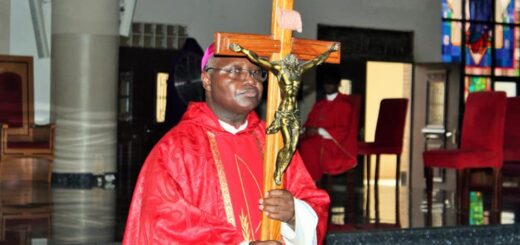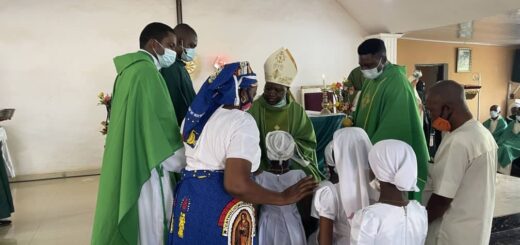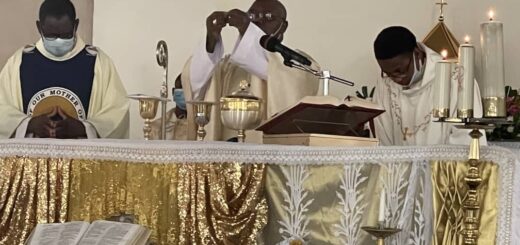Recognize your areas of unfaithfulness and how to reconcile to God
by ARCH BISHOP · March 20, 2022
Readings: Ex. 3: 1-8, 13-15; Ps. 102: 1-4, 6-8, 11; 1 Cor. 10: 1-6, 10-12; Lk. 13: 1-9
It is wonderful to visit you on this third Sunday of Lent and to pray with you my dear people of God in St. Joseph Mukasa’s Parish, Gidan Mangoro, with 218 candidates ready to receive the sacrament of confirmation, 12 intending couples to be joined in holy matrimony, and the inauguration of the newly elected members of the Parish Pastoral Council and the Parish Finance Council. I am happy not because I expect to eat a lot of mangoes, since “Gidan Mangoro” in Hausa means, “house of mangoes”, but because I am sure we shall all experience God’s outpouring of blessings on us for more spiritual and pastoral progress.
Your story shows that you gradually evolved from a small community to a parish of great potentials now. I thank the Society of Jesus fathers for supplying pastoral leadership to this parish.
I am always happy to recall that I am a product of two major religious traditions. I was educated, baptized, confirmed, ordained a priest and a Bishop by Irish Augustinian priests. The Jesuits gave me post graduate training between 1986 and 1991 in Rome, at the Pontifical Gregorian University, for which I remain so very grateful. I count on your collaboration to assist me in my mission in the Archdiocese of Abuja, so that together we can witness more fruitful pastoral, educational, and social services to the people.
Midway into Lent, the Church reminds us not to allow the grace of the season to waste, as we look up with joyful anticipation of the Easter celebrations. The readings help us to recognize our areas of unfaithfulness and how we need to seek to reconcile ourselves to God.
The first reading from Exodus reveals who God is, one who notices and cares for His people: “I have seen the miserable state of my people in Egypt….” And He says, “I mean to deliver them out of the hand of the Egyptians….” (Ex. 3:7-8). He did so using the great leadership of Moses, called after an encounter with God in the burning bush. Revealing His unique name, “I am who I am” God was telling Moses that He is unchanging, and so always the same.
Even though Moses was concerned about his speech impairment, for he was not eloquent, God was ready to use him to give voice to God’s care for His oppressed people. The Israelites’ trust and faith in God brought about miracles and victory in battles; but their disobedience and rebellion against God and His commands caused destruction and death.
In the second reading, Paul warns the Corinthians and therefore all of us, to be careful not to take God’s love and compassion for granted (spiritual complacency). He reminded them of the experience of the Israelites on their forty years journey in the desert, where they murmured against God (cf. Ex. 16, 17; Num. 20:1-13), but God responded with mercy by giving them manna, and water from the rock. God has shown us the height of love by sending His only begotten Son so that we may have life and have it in abundance (cf. Jn. 13:1), and even when we fail to see His hand steering our actions and guiding our daily events, He still loves and cares. He still listens to our cry for help; ready to set us free from the shackles of sin, to live in the freedom and blessedness of the children of God.
In the Gospel, the parable of the fig tree teaches us how God is patient with us in our spiritual unfruitfulness and waits for our spiritual regeneration, to bear fruits of love, joy, peace, patience, understanding, kindness, fidelity, gentleness and self-control (cf. Gal. 5:22). The fig tree that does not bear fruit refers to nominal Christians who are tied to Jesus only by an outward profession, but without the fruits of the Holy Spirit, and so bear the fruits of immorality, impurity and shamelessness, idol worship and magic, hatred, jealousy, violence, anger, ambition, division, factions, envy, drunkenness, orgies and the like (cf. Gal. 5:19).
We must not fail to see how Moses, a God-fearing, courageous and focused leader led his people in very difficult times. Our leaders can lead Nigerians to freedom from poverty if they renounce offending their people with unfriendly policies, reject empty political sophistry, self serving leadership and sterile political ramblings.
If Moses, trusting God could provide water and bread for the people throughout their days of wilderness-wandering, why should Nigerian leaders even with the great material blessings we have be unable to provide adequate infrastructure, basic necessities and social insurance for all citizens?
The people of Israel on their part did what made God not to be pleased with most of them, and “they were struck down in the desert”. St. Paul tells us that despite all the events and signs God had performed among them, the Israelites did not please God. They complained so much that it took forty years for them to make it from Egypt to their Promised Land, a distance of about 250 miles that should not have taken more than three weeks! We Christians must guard against spiritual complacency. We receive Christ in the Holy Eucharist and other sacraments; we hear and meditate on the Word of God; we frequent Church activities, but not always leading a life, renewed in grace. Lent invites us to fix our eyes on Jesus no matter the difficulty or how badly we have failed. God is never tired of washing us clean and bringing us back unto to Him. We should never get tired of seeking His face of mercy.




